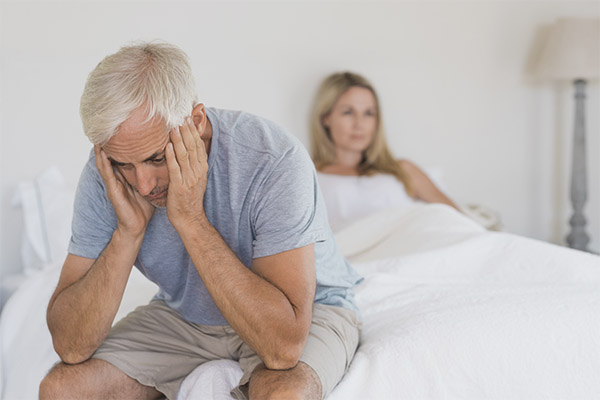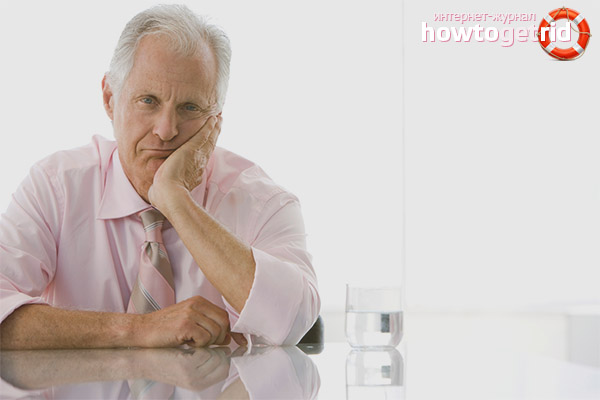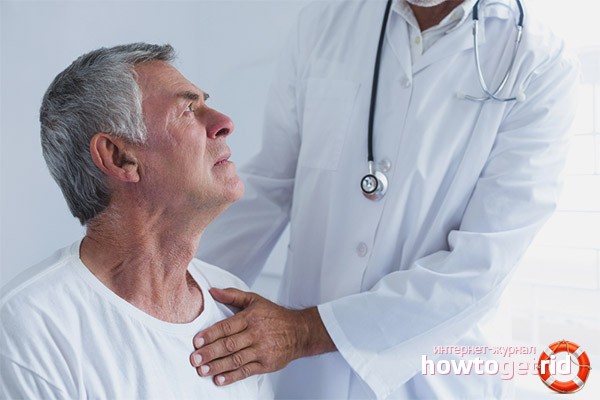The content of the article
To date, it has been established that male menopause or andropause really exists and is a normal physiological phenomenon. The first changes the patient notices after 50 years, but there are cases and earlier menopause.
It is known that andropause is due to a decrease in the secretion of the sex hormone testosterone, which affects the potency and libido, psychological mood and general well-being.
A man aged 45 and over should understand why this condition occurs, what symptoms point to it and what can be done to improve the quality of life.
Why there is a male menopause
First of all, changes in the reproductive and sexual system of men are due to age. Low levels of testosterone and other male hormones (androgens) lead to a decrease in the quality and quantity of spermatozoa.And our organism is arranged wisely - if there is no possibility to conceive a child, then the potency and sexual desire gradually dies away, the erection disappears. In rare cases, the breast glands may even grow (gynecomastia).
Researches of doctors show that already from 30 years the secretion of androgens is reduced and by the age of 40 it reaches 1-3%. However, reproductive impairment before the age of 45 is considered an early menopause and requires medical intervention. Late form develops only after 60 years.
Non-physiological causes are associated with a number of circumstances:
- Systemic diseases, surgical interventions on the genitals. Infection or inflammation of the testicles (for example, chronic prostatitis, epididymitis, orchitis, etc.), as well as surgical treatment can change the structure of the organ, cause dysfunction and bring the onset of male menopause. Surgical castration also causes early andropause.
- Injuries to the reproductive system. Mechanical damage to the testicles or the penis is one of the causes of the approach of male menopause.
- Conservative drug therapy. Some drugs seriously "hit" on the reproductive function of men.For example, drugs for the treatment of benign and malignant tumors, genetic diseases, prostatitis and other pathologies of the reproductive system have side effects in the form of early andropause. Sometimes the cause of such a drug-induced menopause is the error of the doctor who did not select the desired drug or dosage in accordance with the age and individual characteristics of the patient.
- External factors (radiation exposure, heavy loads, work in hazardous industries, poisoning with toxins). All these processes in one way or another affect the endocrine system and disrupt the secretion of sex hormones.
- Bad habits. According to some reports, chronic alcoholism and long-term smoking indirectly approximate male menopause, inhibit reproductive function and potency.
- Hypodynamia. Lack of healthy loads and sedentary work lead to stagnation in the pelvic organs. The blood supply to the testicles and penis is impaired, as a result of which reproductive function suffers.
Symptoms of andropause
In many men, early manifestations are absent or mild,due to which they are blamed on other diseases. Then the clinical signs become more visible and relate to different areas of life.
Symptoms of andropause (sexual life):
- Libido decreases, a man rarely wants to have an intimate relationship, or completely loses interest in sex.
- An erection occurs slowly, the penis may not reach a full erect state.
- Ejaculation can be delayed or premature for an extended period.
- Changes in the quality and mobility of spermatozoa, which is why the reproductive function is depressed (male factor of infertility).
- Lack of pleasure after ejaculation, fatigue and weakness after intercourse.
Signs of andropause are noted in the general physiology of men:
- The prostate gland can become enlarged and inflamed, leading to impaired urination (cystitis, slowing down of the process, discomfort and burning when the bladder is empty).
- Atrophy of muscle tissue and its degeneration into fat. Accompanied by an active weight gain and a decrease in power indicators.
- Decreased bone density, causing the spine to shrink and shrink growth.
- The disproportion of the figure: the man becomes stooped, the skin on his hands hangs down, the so-called "beer belly" appears.
- Arise pain in the joints, muscles and spine. Numbness of the limbs, muscles of the shoulder girdle is also possible.
- Pathologies of the nervous and cardiovascular systems are observed: changes in pressure, dizziness, cardiac rhythm disturbances, etc.
- Violations of thermoregulation, sweating, "hot flushes" of heat and other pathologies of the vascular system.
- The feeling of a sudden lack of air, which is accompanied by dizziness.
- Weakness, lethargy, decreased performance, decreased concentration, memory impairment.
- Mental disorders: depression or apathy, nervousness, aggression, sleep disturbances (chronic insomnia), panic attacks.
Of course, the patient does not observe all changes at the same time. But if at least 4-7 signs are noted, then it is necessary to contact an andrologist or urologist to exclude menopause.
Diagnostics and research methods
Age-related andropause may be masked as a disease of the genitourinary system, general pathologies, and CNS disorders.That is why differential diagnosis is necessary for a number of highly specialized doctors: a cardiologist, an endocrinologist, a psychiatrist, a neurologist, a urologist, etc. Experts collect history and prescribe studies that will help identify the true cause of symptoms.
First of all, to detect a deficiency of androgenic hormones, the doctor prescribes the determination of the level of total, as well as biologically active testosterone in the blood plasma. Other hormones are additionally investigated: steroid binding globulin, FSH, prolactin, LH, etc.
Further, the andrologist with the help of a special scale assesses the degree of erectile dysfunction and decrease in libido, obstruction of the lower urinary tract, prescribes a spermogram.
To exclude diseases of the genitourinary system prescribe the following studies:
- rectal palpation of the prostate gland;
- Ultrasound of the genital organs (prostate, scrotum, USDG of the vessels of the penis);
- PSA level in the blood (tumor marker).
For the differential diagnosis of other disorders used examinations:
- ECG, echocardiography;
- USDG of the neck and head vessels;
- the level of glucose, lipoproteins, cholesterol in plasma;
- the level of thyroid-stimulating hormones in the blood;
- study of bone metabolism, etc.
Andropause treatment regimen
Since the process is physiological and irreversible, the therapy will be aimed at eliminating the disturbing symptoms and improving the patient’s quality of life, including sex.
Treatment regimens can be conservative (drugs, hormone replacement therapy) and non-drug:
- homeopathy;
- phytotherapy, dietary supplements and biological supplements;
- consultation with a psychologist.
And also physiotherapy (acupuncture, hirudotherapy, manual therapy, balneotherapy, laser therapy, galvanization, electrical stimulation, ozone therapy, mud baths, etc.) and exercise therapy.
To maintain the physiological level of testosterone, hormone replacement therapy is prescribed in the form of oral tablets, solutions for intramuscular injections, transdermal patches or gels. The treatment is carried out under the strict supervision of an endocrinologist. The result of therapy: improvement of physical activity and muscle tone, reduction of signs of irritability and depression, increased libido and normalization of potency.
In some cases, stimulating treatment of hCG is carried out, which allows you to restore your own testosterone production.
Additionally, the patient needs to establish physical activity, enroll in sports clubs, aqua aerobics, etc. You should also give up bad habits, follow the recommended diet, control weight. It is known that pushing the onset of male menopause and reduce its manifestations helps regular sex life.
Comprehensive use of drug and non-drug schemes allows you to restore sexual function and improve the quality of life of older patients.
Prevention of male menopause
For each man, andropause occurs individually and may depend on the quality of intimate life, psychological attitude, general activity, health, and a number of other factors.
To prevent early andropause and postpone physiological aging, the following preventive measures should be observed:
- From the age of 40, visit a urologist and an andrologist at least 2 times a year.
- Observe the regime of active work and rest, do not forget about a full sleep (from 8 hours or more).
- Load the body with adequate exercise, walks in the fresh air.
- Adjust the diet in accordance with the recommendations of a nutritionist (control the consumption of simple carbohydrates and lipids).
- Take a douche shower every day, but limit visits to the sauna and bath, refuse to hot tubs (harmful to the testicular reproductive function).
- Abandon bad habits or sharply limit them.
- Observe personal hygiene, paying attention to the genital area, every day, even in the absence of intimate life.
- To establish a regular sex life, but exclude casual sex.
- Avoid hypothermia.
With a little effort, you can not only improve the quality of life, but also push back various age-related changes in the body, including male menopause. But if andropause still has arrived, remember that this is not a disease, but a natural stage, and it still depends on you how much its manifestations will affect spheres of life.
Video: male menopause












To send